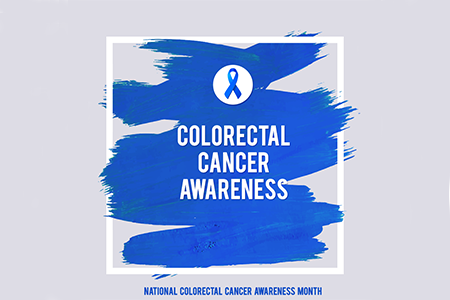 March is National Colorectal Cancer Awareness Month. To increase awareness, the Colorectal Cancer Alliance (CC Alliance) has launched a public awareness campaign called "Don't Assume". This organization aims to challenge assumptions about colorectal cancer through online, print, and social media marketing. Unfortunately, this type of cancer is the third most common cancer in the US and the second leading cause of cancer-related deaths1.
March is National Colorectal Cancer Awareness Month. To increase awareness, the Colorectal Cancer Alliance (CC Alliance) has launched a public awareness campaign called "Don't Assume". This organization aims to challenge assumptions about colorectal cancer through online, print, and social media marketing. Unfortunately, this type of cancer is the third most common cancer in the US and the second leading cause of cancer-related deaths1. While previous studies have shown that the chances of developing colorectal cancer are highest above age fifty, new research is highlighting the development of this disease in a much younger population. To continue spreading awareness, this review will highlight the goals of National Colorectal Cancer Awareness month as well as various clinical trials relating to cancer screening, treatment, and prevention.
What is Colorectal Cancer?
Colorectal cancer refers to the presence of cancer in either the colon or rectum. Both types of cancers usually begin with a polyp — a small growth that can potentially grow into a malignant tumor2.During routine colonoscopies, polyps are usually biopsied and/or removed depending on their location and size. If a polyp does grow into a cancerous tumor and spreads outside the colon, the cancer usually metastasizes to the nearby lymph nodes, liver, and lungs. While metastatic cancer is historically hard to treat, surgery in combination with multiple chemotherapeutic and antineoplastic drugs have resulted in higher survival rates3. There are many ongoing studies on the different treatments for various stages of colorectal cancer.
Never Too Young
The Never Too Young program highlights young people who have been diagnosed with colorectal cancer in their twenties. In fact, the incidence of new colorectal cancers is rising in those under fifty years old and declining in those over fifty. Usually thought of as a disease that should only be screened for in those over fifty, the CC Alliance is recommending much earlier screening for those with a family history or possible symptoms.Who Should be Screened for Colorectal Cancer?
According to new research, everyone should be screened by age forty-five at a minimum. For those who have Crohn's disease, colitis, and inflammatory bowel diseases, regular colonoscopies every two-to-five years are recommended, regardless of age.When compared to other symptomatic cancers, most patients find that discussing colorectal-related symptoms with their physicians to be more uncomfortable. Therefore, the CC Alliance is striving for increased communication and support to those who may have symptoms but do not report them to their doctors.
Colorectal Cancer Clinical Trials
Prevention Trials
Prevention trials aim to study new drugs or lifestyle changes that could postpone or prevent the development of cancer. Since these patients are usually higher-risk than the general public, they are studied for multiple years to establish significant data. Certain factors increase the chances of developing colorectal cancer, such as familial history and race.Screening Trials
Screening trials are conducted in asymptomatic, healthy volunteers to help discover malignancies earlier than current techniques. One example of a non-invasive cancer screening test is the liquid biopsy — which uses samples from either urine, blood, or saliva. Multiple startup companies, biotechs, and universities are actively pursuing cancer-related biomarker detection through these new tests. The goal with these types of trials is to add certainty to diagnoses much earlier than current techniques, which rely on patient-reported symptoms4.Diagnostic Trials
Diagnostic trials are trials aimed at detecting the presence of a disease at an earlier point using novel techniques and biomarkers. These trials compare the standard diagnostic interventions recommended for the disease in question and compare the results of new diagnostic practices5. The patients in these trials usually have developing signs and symptoms of cancer but are healthy enough to undergo testing and experimental treatment options.Treatment Trials
Treatment trials are the most common form of clinical trials currently active with the National Cancer Institute. Each trial is usually very specific to patients that have certain mutations, metastatic tumors, or have previously reacted poorly to chemotherapeutics. The "Targeted Therapy Directed by Genetic Testing in Treating Patients with Advanced Refractory Solid Tumors, Lymphomas, or Multiple Myeloma (The MATCH Screening Trial)" is currently active in over 1,100 locations. This trial aims to study the efficacy of treatments influenced by genetic testing in patients with solid tumors or lymphomas that have not responded to previous treatments.Supportive Care Trials
Supportive care trials refer to testing treatments that aim to lessen the symptoms of chemotherapy and radiation. In addition, these types of trials may also address the caregivers and family members of those affected with cancer and how to support themselves as well as the patient.While drugs to remedy the chemo side effects are important, additional studies are conducted into nutrition and lifestyle changes that may ease the pain and disease's effect on the patient. NIH's NCI Division of Cancer Prevention's Supportive and Palliative Care Research program aims to study the impacts of caregiver and patient quality of life during treatment through the end of life. The program also provides support for both acute and chronic conditions brought on by aggressive cancer treatments.






.jpg)

.jpg)
.jpg)
.jpg)
.jpg)





.jpg)
.jpg)


.jpg)



.jpg)




.jpg)

.jpg)
.jpg)





